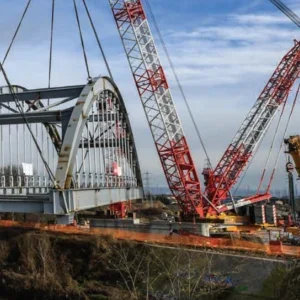If you missed last month’s issue of Cranes Today, or if you are not a particularly close observer of the US rental scene, the odds are that Maxim will not be a familiar name to you. In fact the company has been around for many years, kind of, for Maxim is the new name for Anthony Crane Rental and the eight companies that it has acquired in the past 15 months.
The name Jeff Fenton is also likely to be new to you. He was brought in as chief executive officer of the Anthony group of companies in October 1999.
The change process began in 1998 when investment company Bain Capital bought a majority shareholding of the Anthony family’s company. Today Bain owns 80%, with the other 20% shared by the previous owners and the current management.
Since the Bain takeover, the company has doubled in size. It now has more than 2,000 employees in five regional bases and 46 depots around the USA, and it’s best estimate is that it has about 20% of the US crane rental market.
The main reason for the name change, Fenton explains, is to present “a consistent image of who we are”. With all the disparate acquired companies, including Kentucky-based Carlisle Equipment, still retaining their own identity, it was time to pull the whole lot together into a coherent whole. “We get a lot of enquiries from companies who want to do business with us on a national level,” says Fenton. With major companies increasingly looking to outsource to a small number of key suppliers, Fenton is looking to build relationships with key clients.
Is there a risk that changing the company’s name could backfire? People have heard of Anthony and Carlisle, but who knows Maxim? “It is always a risk when you do something like this,” he concedes, “but I think that unifying the name will give us more recognition in the field and leverage with our customers.” Of course, he could have just unified the company under the established Anthony name. Does throwing out the Anthony name imply that, for all the company’s might, it is a blemished brand? “Anthony Crane Rental has been known throughout the industry as a leading crane rental company,” says Fenton. “By acquiring Anthony and other top name companies as Carlisle, Husky Crane, Dunn Equipment, Hawk Crane, Lindsey Crane, King’s Crane, Capital Crane, Newton Crane, AAA Crane and Sacremento Valley Crane, Maxim Crane Works has solidified its position as the industry leader and offers the most modern fleet of cranes and equipment available.” Fenton himself, according to a statement put out by Maxim’s press agents, is “recognised as one of the construction industry’s foremost leaders in business management”. Here’s more from the media management team: “Formerly a top international executive with General Electric USA, Fenton is no stranger to bold success stories. His rising career with GE spanned more than 21 years and three continents. Most recently, as president and CEO of GE’s Capital Modular Space Division, Fenton was a key player in building GE’s $600m modular space business and an operating fleet of 140,000 units worldwide.” Though Fenton is at the helm, he has a strong team of experienced industry professionals running the operations under a new structure. Brian Carlisle, based in Kentucky, runs the Midwest; Al Bove in Phoenix runs the West; Dave Mahokey in Pittsburgh runs the Central region; Joe Connelly runs the Northeast; from Atlanta Ray Grant runs the Southeast. Carlisle also runs the crawler crane division and Grant is in charge of the growing tower crane division. Then there is the heavylift joint venture, AVS, with Van Seumeren of the Netherlands. Hans van Breukelen of Van Seumeren is president of AVS, but Bove is in charge of Maxim’s interests in the venture.
Fenton outlines his goals for Maxim: “We are working hard on many fronts to become the crane supplier of choice for the markets we serve.” Top priorities are customer service and safety.
“We are in a service industry and have some very good competitors and need to prove ourself everyday,” he says. “We have taken steps to align our regions and product lines in such a way that we can offer our customers the broadest array of lifting and crane equipment with a level of supporting expertise that is second to none.” On the safety front, 85% of Maxim operators are certified with the National Commission for the Certification of Crane Operators. By the end of the year all of them will be CCO certified, Fenton says.
“Operating safely is important to our employees and customers as well as for our industry. In addition to having all our operators CCO trained and certified we are enhancing our internal safety training efforts and will continue to search for process and technology improvements that will lead to safer operations.” Construction safety expert Andy Peters joined the company’s executive team in February “to further facilitate our safety efforts”.
For all its prowess, however, Maxim is a loss-making operation. In the first quarter of 2000 it made a net loss of $5.3m on revenues of $97.6m. In 1999 it made a net loss of $15.7m, with $8.8m of that coming in the fourth quarter as interest charges built up on debts incurred for acquisitions. In 1998 the company made a net loss of $7.1m. Rental revenues for 1999 rose to $264.7m, up from $183.7m, and earnings before interest, taxes, depreciation and amortisation (EBITDA) rose to $80.9m, up from $60.6m in 1998.
Fenton is confident, however, that the financial picture is improving. “We will be profitable this year. Our margins are strong and getting better. We expect utilisation to be up this year. Towers and crawlers are basically already fully utilised. So far, after the first quarter, we are satisfied that things are going in the right direction.” He adds: “Contrary to what some people may think, we have tremendous backing to grow our business and build long term value for our shareholders. I am pleased at the progress we are making and I expect that we will continue to grow stronger, both operationally and financially, as the year unfolds.” While at GE, Fenton worked in Europe for a number of years. He worked in Belgium where he “was responsible for creating a pan-European Modular Space business by establishing a management infrastructure and creating an executive team who, under his leadership, grew the company’s fleet to the largest in Europe”. Before that he had been managing director of GE Medical Systems in England.
In spite of this international outlook, he does not plan to take Maxim overseas. “We will focus on the USA,” he says. “There is plenty of scope for growth here without chasing after international work.” More US acquisitions are always being planned but the rate of growth will slow to a mere 30% to 40% over the next two years, he suggests.
Clearly Fenton brings much business experience to the crane industry. It will be interesting to see what lessons he brings from GE, which (along with Motorola) pioneered the vogue management initiative Six Sigma, a quality-based, waste minimising management tool that derives from defect probability analysis.
“The concept is to ensure your business processes are efficient and your results are predictable and effective,” he explains. “Using Six Sigma, you start with the end customers requirements and work your way back to ensure your processes, products, and people are doing the things right the first time to satisfy the requirement. So all this being said, is Six Sigma relevant to Maxim Crane Works and the broader crane industry? Yes! “We want to ensure that we understand and meet our customers’ requirements, we want our employees fully engaged making a difference everyday and we expect to improve the profitability of our company to fuel our continued growth.
“We will continue to look for ways to leverage Six Sigma thinking and process improvement in Maxim Crane Works, but we will do it in a way that makes sense for our business model.”






